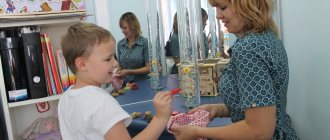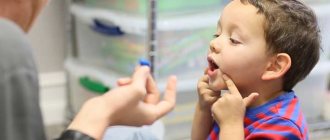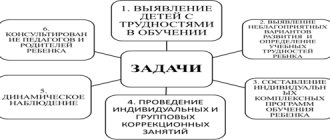Speech therapists and speech pathologists – they work in the same field, have a common education and similar working methods. During their studies, they are connected by a common faculty and a number of disciplines. Both of them study psychiatry, neuralgia, psychology and pedagogy. All their activities are not just correction of sound pronunciation, but also individual interaction with the child.
There is so much in common, but, nevertheless, these are two different specialists, and here the question arises: what kind of teacher does a child need to say goodbye to psychophysical disabilities? Speech therapist and defectologist - what's the difference ? Let's find out below.
When is this or that specialist needed?
In recent years, more and more children are faced with developmental disorders, and more and more parents are looking for a competent and experienced specialist. Children who, for one reason or another, have problems with adaptation, speech development, communication and learning at school or kindergarten need the help of a highly specialized specialist. The root of the problem may be as follows:
- birth injuries;
- infections acquired during fetal development;
- diseases that arise at an early stage of development;
- disorders of neuralgic and psychological nature.
This is only a small part of the existing reasons. More specifically, parents whose children have been diagnosed with cerebral palsy, autism, echolalia, hearing or vision impairment often seek help.
Features of the work of a speech therapist
A speech therapist is a kind of defectologist, but there are nuances here. Defectology is usually called a scientific discipline from the category of pedagogy, which develops and applies all kinds of methods aimed at eliminating developmental deficiencies. The methods belong to the class of restorative and educational. Main directions of the discipline:
- Speech therapy is a part of pedagogy based on speech difficulties.
- Deaf pedagogy – works exclusively with children who are hard of hearing or completely deaf.
- Typhlopedagogy – works with those who have visual disorders.
- Oligophrenopedagogy – helps children with severe mental retardation.
Thus, speech therapists are highly specialized defectologists who specialize in the correction of speech deviations. Defectologists include teachers of the deaf, oligophrenopedagogues, and typhlopedagogues. This is the main answer to the question “what is the difference between a defectologist and a speech therapist?”
What does a speech therapist usually do?
Adults seek the help of a specialist when they identify language disorders in their child. It is not difficult to find a speech therapist in the city: their “habitat” is schools, boarding schools, kindergartens, clubs, development centers and even clinics.
Before a speech therapist begins working with a child, it is necessary to establish an accurate diagnosis, and a psychological and medical commission will undertake this. They find the “root” of speech pathology, and the speech therapist, based on the diagnosis, selects an effective technique to prevent disorders.
Sometimes parents look at the work of a speech therapist superficially, believing that their task is to correct incorrect pronunciation of letters and sounds. The work of a specialist is much more ambitious - it is aimed at improving speech in general. The teacher helps:
- normalize coherent speech;
- correct incorrect pronunciation of sounds;
- expand your vocabulary;
- improve phonemic awareness;
- develop grammatical skills;
- work on nonverbal communication (movements, gestures).
While working with a speech therapist, the child learns to competently ask questions, invent stories and conduct dialogues. The interlocutors in the dialogues are both other children and adults. In addition, the teacher sets the goal of preventing written disorders, developing memory, thinking, motor skills and perception of the surrounding space.
All of the above is how a speech therapist differs from a defectologist , but in the work of the latter there are many overlapping tasks.
Speech therapist: how and with whom he works
From the information presented above, it is clear that a speech therapist is the same defectologist, only highly specialized. However, speech therapists can also have different specializations.
Speech pathologist-defectologist
A speech therapist-defectologist is a professional with a pedagogical education who has undergone training in the field of defectology. His field of activity is speech disorders that develop in children with autism, mental retardation, cerebral palsy, neuroses, etc.
His training program includes areas of knowledge that make it possible to identify the root cause of speech defects and find an approach to the young student.
The following problems are under the supervision of a speech pathologist:
- Dysarthria (incorrect sound pronunciation due to limited mobility of the speech organs).
- Alalia – absence of speech with intact intelligence. May be partial or complete. Its common cause is brain damage.
- Rhinolalia (nasal syndrome). It is expressed in a change in voice timbre and distortion of sound pronunciation due to a violation of the resonator function of the nasal or nasopharyngeal region.
- Incorrect rate of speech: tachylalia (very fast pace), bradylalia (slow speech).
- Aphonia (dysphonia) – loss of sonority of the voice, the ability to speak only in a whisper.
- Stuttering is the forced repetition of sounds, syllables or words. May be manifested by frequent stops that disrupt the normal rhythm of speech.
- Speech defects arising from hearing problems.
- Consequences of operations on the hearing organs and speech apparatus.
- Problems that arise in the process of mastering reading and writing (dyslexia, dysgraphia, dysorthography).
The work of a speech pathologist-defectologist is aimed not only at teaching the correct pronunciation of sounds. He strives (as far as possible) to “pull up” the level of development of the ward, helping to adapt to the surrounding reality, improving his thinking, memory, and attention.
to contents ^
“Regular” speech therapist
Speech therapists work in kindergartens, schools, and various development centers. They are often called "regular speech therapists." Their task is to help healthy children without serious developmental disabilities. Usually these are graduates of the faculties of pedagogy or philological faculties.
The speech therapist not only “produces” sounds, but helps to enrich the vocabulary, works on intonation, teaches competent sentence construction, logical, coherent, beautiful speech. It is useful for schoolchildren in developing correct written speech.
About the profession of a speech therapist - in this video:
To summarize, we can say that a speech pathologist-defectologist is a specialist with a wider field of activity compared to an ordinary speech therapist. As a highly specialized defectologist, he is in charge of correcting speech disorders that arise against the background of developmental disorders. And “just a speech therapist” corrects speech deficiencies in healthy children.
to contents ^
Features of the work of a teacher-defectologist
The activities of a professional in the field of defectology depend on his specialization. The child needs his methods when problems arise that cannot be solved during classical education. A defectologist must be an expert in the disorder that is inherent in the child. Namely, in speech, visual, auditory or intellectual. For example, if a speech disorder arose against the background of mental retardation, the leading teacher will be an oligophrenopedagogist.
Let us give a clear example: if a child has hearing problems, the teacher’s work is aimed at developing non-verbal communication. If problems are related to vision, spatial orientation training takes place.
Speech therapist teacher or doctor. Is a speech therapist a doctor or a teacher?
Educational webinars for teachers
The certificate is issued immediately after passing the License for educational activities - No. 0001058
4 webinars
3 webinars
You cannot become a doctor through retraining courses. To do this, it is not enough to listen to a several-hour course. A defectologist is a different matter! This is both a doctor and a teacher. Naturally, ideally. There are plenty of mediocrities, strangers, soulless people among representatives of any profession. If a speech therapist (with any level of preparedness) copes with his duties, honor and praise to him! Many achieve a lot even without defectological education. Especially when they treat children and their work with soul. As befits a TEACHER. Here is the answer. Not every speech therapist is a teacher. But only the one who is essentially a teacher.
(community expert)
There is such a resolution. DECISION of August 8, 2013 N 678 ON THE APPROVAL OF THE NOMENCLATURE OF POSITIONS OF TEACHING EMPLOYEES OF ORGANIZATIONS CARRYING OUT EDUCATIONAL ACTIVITIES, POSITIONS OF LEADERS OF EDUCATIONAL ORGANIZATIONS It clearly states, that in educational organizations there is a position of Speech-Language Therapist TEACHER, and the title of the position “Speech-Language Therapist” is provided for organizations in the field health and social services carrying out educational activities as an additional type of activity. Speech therapist is a specialist with a higher pedagogical defectology education in the specialty of speech therapy, proficient in the methods of neuropsychological examination of patients with speech disorders and other higher mental functions, individual and group rehabilitation training, theoretical and practical knowledge in the field of defectology, provided for by the training program in accordance with the requirements of the qualification characteristics and certified in speech therapy. A speech therapist conducts a diagnostic examination of patients with speech disorders and other higher mental functions. Together with the doctor, he develops individual programs for medical and pedagogical rehabilitation of patients with speech disorders and other higher mental functions (aphasia, dysarthria, agnosia, apraxia, dyslexia, dysgraphia, stuttering, delayed speech development, etc.). Every children's clinic should have a speech therapist's office. So, in school a teacher is a speech therapist, and in the healthcare sector, a speech therapist. But their education is pedagogical.
There is a speech therapist, a doctor who examines children, identifies the causes of speech disorders and makes the correct diagnosis, writes recommendations for eliminating the defect, prescribes medication if necessary, and a teacher-speech therapist corrects speech with developmental activities, based on the recommendations of the speech therapist.
Why did such a question suddenly arise? It has always been like this - in the clinic there is a doctor, and in educational organizations - a teacher, as they said above. I think that a speech therapist without medical education should not work in a medical institution. There are specifics.
Hello, Anna Yuryevna! It depends which way you look at it. If a speech therapist has a medical education and works in this field, then it is possible that he is a doctor. My son and I saw such a specialist. Well, this is basically a teacher, especially if he has also undergone professional retraining. So it all depends on the situation.
General tasks of speech pathologists
The main work of specialists is aimed at developing the child’s cognition, which is achieved through diverse programs and methods. This includes the development of memory, attention, and mental processes. Despite the narrow profile of special education teachers, they all solve similar problems:
- individual development of sensory skills;
- development of cultural and hygienic skills;
- the formation of correct speech, achieved by expanding one’s horizons (the teacher introduces the child to the world around him, thereby replenishing his vocabulary and forming coherent speech);
- demonstration of gaming techniques (if gaming skills do not correspond to the child’s age);
- acquisition of skills in written and oral speech by the method of auditory perception (the child finds sounds in spoken words);
- the formation of simple arithmetic skills (thanks to acquired knowledge about the quantitative and temporal features of objects);
- development of motor skills with the help of simple creative tasks.
When is a consultation with a speech pathologist needed?
The formation of active speech is an important process that occurs at each child’s own pace. However, parents need to ensure that this individuality does not go beyond age norms. A child’s development should be diagnosed, if not every year, then at least at important key moments, when speech and cognitive skills are especially actively developing - at 2-3 years, before entering 1st grade (6 years) and during the first years of school.
This applies to cases where the child does not have obvious signs of possible disorders. In addition, parents should pay attention to the following points:
- The child has a noticeable delay in speech formation. For example, he speaks in monosyllables, using more facial expressions and gestures to communicate.
- Speech is formed on time, but is slurred and difficult to understand for outsiders.
- There are problems with sound pronunciation.
- There are behavioral disorders - problems communicating with peers, isolation, absent-mindedness, signs of aggression, increased excitability, motor skills disorders.
It is the speech therapist-defectologist who will help find the reasons for the deviations that worry parents and either refer the child to a specialist or offer a plan of corrective work to cope with the problem.
Date of publication: 08/13/2016. Last modified: 01/29/2021.
Let's sum it up
Summarizing the above, to answer the exciting question “What is the difference between a speech therapist and a speech pathologist?” is not difficult: the first teaches verbal and non-verbal communication, working on linguistic units (words, phrases, etc.), the second is aimed at the content of this communication. The latter is achieved by broadening one’s horizons and adapting to society.
Theoretically, speech therapists and defectologists should work both with groups of children and with each child separately. However, in practice, each specialist insists on individual lessons. When working with one baby, you can take into account all his features. During classes, the main task is to determine the path of development of children's speech, further education and training.
The specialist provides assistance both to the child, demonstrating this in classes and observing the progress of general development, and to his parents, providing detailed consultations and recommendations.
Scope of activity of a speech therapist
Unlike a defectologist, a speech therapist begins working with children only after 3 years of age
, when you can clearly track problems in pronunciation and eliminate them. Consultation with a specialist is required for a child who does not have an organic or functional pathology, and the problem lies in the individual characteristics of speech development.
Classes with a speech therapist include:
- staging the pronunciation of individual letters or their sound combinations;
- combating too fast or slow speech;
- elimination of stuttering;
- improving speech clarity;
- improving or teaching reading skills;
- struggle with voice volume and individual intonations of pronunciation;
- overcoming psychological blocks of communication (fear, embarrassment, fear of speaking among a large number of people, and so on).
Every parent needs to know the difference between a doctor and a speech pathologist, since children with pathology are not taken to a speech therapist.
It does not treat problems of psychomotor development and does not work with children who have concomitant pathologies (usually hearing aids).
Where can I find an experienced speech therapist?
The key to a child’s rapid and effective development is a well-chosen speech therapist with years of experience and dozens of reviews behind him. The Center for Restorative Medicine employs a specialist with extensive experience and continuous development in his field. Our clients include not only children, but also people who have suffered from strokes and severe traumatic brain injuries.
Here you and your child will be helped to forget about any problem: developmental delay, violation of the sequence of sounds, stuttering. In addition to serious psychophysical disorders, speech therapists are ready to tackle your unaesthetic speech and incorrect diction.
You can find out about the cost of admission on the website or by calling +7 (8552) 78-09-35, +7 (953) 482-66-62.










